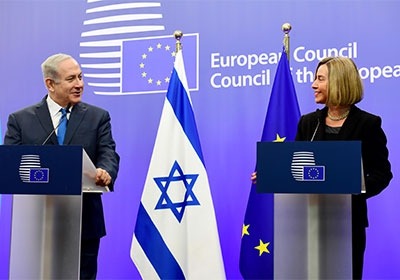The meeting between Israel´s Prime Minister Benyamin Netanyahu and EU High Representative for Foreign Affairs and Security Policy Federica Mogherini started Monday morning in a good atmosphere with both sides saying the right things but ended apparently in disagreement. At a press conference yesterday evening, Mogherini said bluntly that “he can keep his expectations for others because from the EU member states this move (moving embassies to Jerusalem) will not come.”
No joint statement on the way forward was published as this was never the intention and would probably have been impossible.
Before the informal breakfast with the Foreign Affairs Council, Mogherini and Netanyahu made some opening remarks for the press. Mogherini welcomed Netanyahu as a friend and Israel as an important partner to EU.
She also condemned “in the strongest possible way” the recent terror attacks on Jews in Europe and on Israel and Israeli citizens but without mentioning any specific EU country. In particular Sweden was hit by anti-Semitic incidents with firebombs against a synagogue in Gothenburg on Saturday evening and a Jewish cemetery in Malmö on Monday.
In contrast, First Vice-President Timmermans and Commissioner Jourová said in a joint statement yesterday that "We are shocked and outraged by the wave of anti-Semitic attacks and demonstrations that are spreading hatred against Jews in European cities over the last days. We expect the perpetrators of anti-Semitic incitement to be prosecuted.”
“The worst thing that can happen now is an escalation of tensions, of violence,” Mogherini said. “Increased tension and violence would only inflame the region and would be a gift to the extremes and to those that are not interested and actually against peace and security and living together.”
As regards Jerusalem and a peace settlement she repeated EU’s support to what she called the only realistic solution, a two-state solution based on 1967 borders with Jerusalem as the shared capital of both Israel and the future Palestinian state.
Mogherini is right that two states are the only “viable and realistic option” but her approach to a solution for Eastern Jerusalem with its holy places and ancient Jewish presence appears as simplistic. There a creative approach to shared sovereignty would be required. “If others have other ideas, I have not heard them,” she claimed.
“This is our consolidated position and we will continue to respect the international consensus on Jerusalem until the final status of the Holy City is resolved through direct negotiations between the parties,” Mogherini said. “And we hope that the parties can engage in meaningful direct negotiations with the support of the international community.”
But an EU peace initiative is not in the pipeline, Mogherini admitted yesterday evening and preferred to talk about EU’s humanitarian role in war-torn Arab countries such as Syria, Yemen and Iraq and her good relations with Jordan, the custodian of the Muslim holy places in East Jerusalem.
Netanyahu started the morning briefing with listing the close cooperation between EU and Israel in three main areas: security, prosperity and peace. In security, Israeli intelligence has prevented dozens of terrorist attacks, many of them on European soil. In prosperity he referred to innovation in e.g. IT, health, autonomous cars, and cybersecurity, all areas where Israel is a leading partner.
In energy he mentioned the plans for an underwater gas pipeline from the Israeli offshore gas fields to Europe in cooperation with Cyprus, Greece and Italy.
As regards peace, he stated that Israel has extended its hand to peace to its Palestinian neighbors for 100 years, well before there was a state of Israel and after it was established.
“We were attacked not because of this or that piece of territory, but of the idea of any territory, that there would be a Jewish state, a nation-state for the Jewish people in any boundary was rejected by our neighbors.”
Referring to Jerusalem he said “Peace is based on recognizing reality, and I think the fact that Jerusalem is Israel's capital is clearly evident to all of you who visit Israel.”
He concluded optimistically that “There is now an effort underway to bring forward a new peace proposal by the American administration. I think we should give peace a change.” EU would probably counter that if there really is a serious peace proposal underway, it should have been presented by now and not after Trump’s provocative announcement on Jerusalem.
What has been recently leaked seems to imply that Trump’s “ultimate deal” will be biased to Israel and hardly acceptable to the Palestinians. It is also wishful thinking to believe that Netanyahu’s coalition partners in the government will accept the idea of a viable and contiguous Palestinian state next to Israel with all of East Jerusalem as its capital.
M. Apelblat
The Brussels Times

